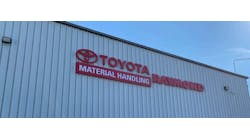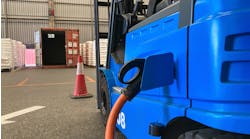In these times of economic uncertainty, it’s almost impossible to find a business that is not scrutinizing operating costs and looking for ways to strengthen the bottom line.
For distribution and manufacturing companies, one question at the top of the list is whether to buy or lease equipment. Unfortunately, there’s no right answer or silver-bullet strategy that will effectively mitigate the financial risk that comes with equipment investments. Purchasing and operations managers must work together to consider the specific application of each piece of equipment to determine the best financial option.
Because a competitive, high-functioning material handling operation relies heavily on lift trucks, the buy-or-lease decision is critical and should be given careful consideration.
When to Lease
Leasing arrangements have steadily increased over the past several years, with dealers across the country reporting leasing represents more than 50% of new lift truck purchases.
The primary reason to lease is to optimize the economic life of the equipment. Particularly in tough economic times, leasing can help companies preserve cash for business growth because leasing typically offers a higher return on equity than direct purchasing.
Leasing also affords the opportunity for a company or operation to try different brands and discover new models. Companies that regularly upgrade equipment and technology due to changing operational demands might value a leasing option because of the ability to capitalize on new products and technology periodically introduced by lift truck manufacturers.
Another reason to consider leasing is to eliminate the hassle of reselling a truck when it’s time to buy a new one. This is especially true for companies that require specialized equipment with customized technology and attachments unique to specific handling requirements.
In addition, leasing can be attractive when interest rates are low or if there is a need to take advantage of a small downpayment option. Capital and operating lease options are available to customers based on financial needs. A capital lease option is ideal for businesses that want the lowest possible payment while still enjoying the benefits of equipment ownership. The operating lease is preferred for companies interested in operating lift trucks without the responsibility and cost of full ownership. Maintenance, customer service and installation costs are often included in the lease, making the option ideal for businesses with large fleets that pay for these services separately.
Though it might be beneficial to lease, particularly in a troubled economy, material handling professionals should still be aware of several factors when signing a leasing agreement. Because credit tends to tighten severely during a recession, they should be prepared to provide specific documents that show proof of financial responsibility. In addition, managers should closely read all the fine print before signing a contract to avoid surprises, which could include restrictions on early termination or hidden costs.
When to Buy
Buying and owning equipment is favorable for light applications in which the lift truck will likely have a long and useful operating life. Companies that use trucks heavily and in harsh conditions or outside in extreme temperatures may want to consider buying since many leasing agreements require the trucks to be maintained and returned in a certain condition. If an operation requires a lift truck to run for long periods of time, purchasing should be considered because lease agreements will restrict the number of hours each truck can be used.
In addition to considering intended application of the equipment, material handling professionals should also closely research maintenance costs and service programs to ensure the cost of caring for the truck does not outweigh the purchase cost.
Word-of-mouth referrals and recommendations are some of the best ways to research, so managers should check with their industry peers and ask for references from dealers.
Most professionals who own equipment keep it well past its expected life. With proper use, maintenance and servicing, a lift truck can run for 10 years or more.
Finally, there are numerous tax advantages to purchasing and owning equipment versus leasing or renting, and purchasing does not come with the rules and regulations spelled out in typical leasing contracts.
Making the Decision
Making a large equipment purchase is never an easy decision. The choice is even more difficult today since operational decisions often mean the difference between success and failure in this stormy economic climate.
The best advice for material handling professionals is to look at all aspects of the business, from the balance sheet to the intended use of the equipment. Managers who would benefit from specialized assistance should speak to their local dealer to learn about various options.
By taking some time to research the pros and cons and analyzing their operations, managers can find the best option for their particular needs. And, smart lift truck procurements decisions will ultimately keep the entire business running smoothly.
Eric Gabriel is financial merchandising manager at Mitsubishi Forklift Trucks. For more information, visit www.mit-lift.com.


